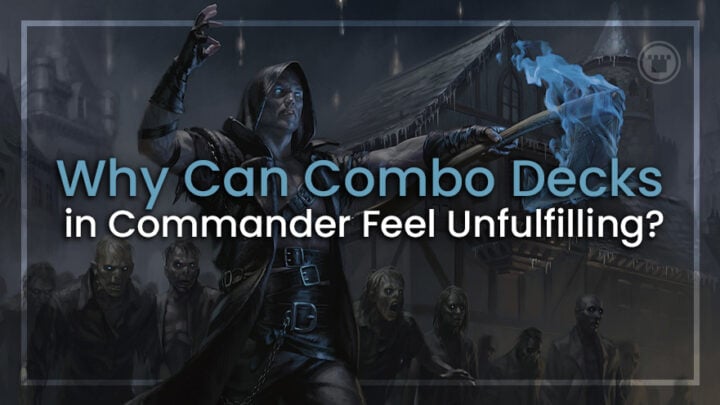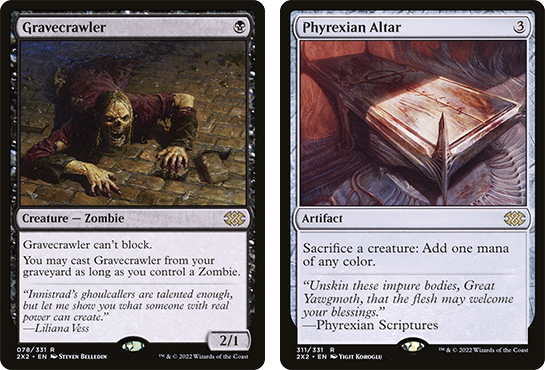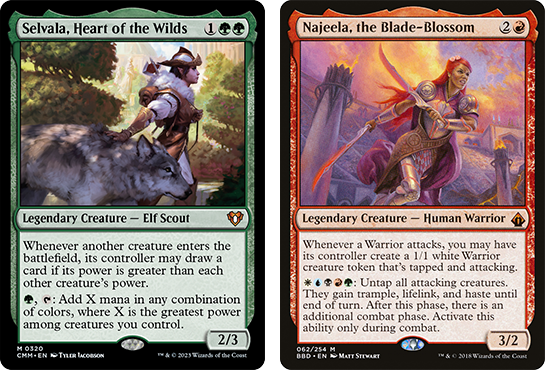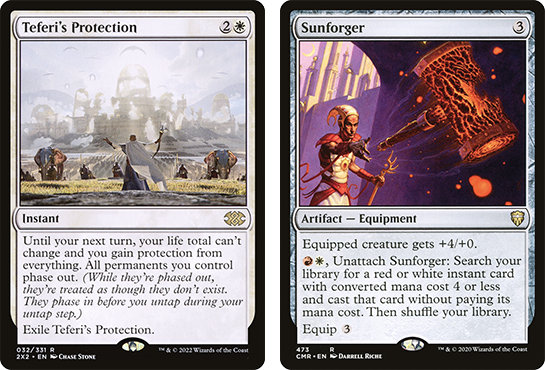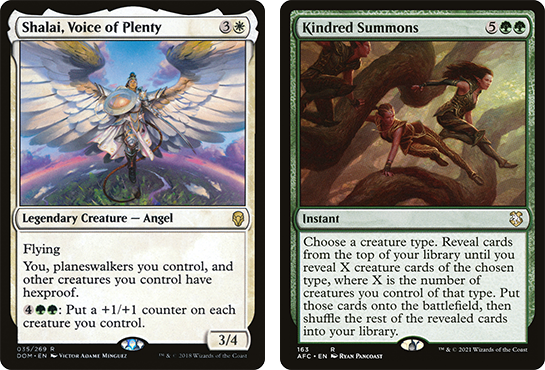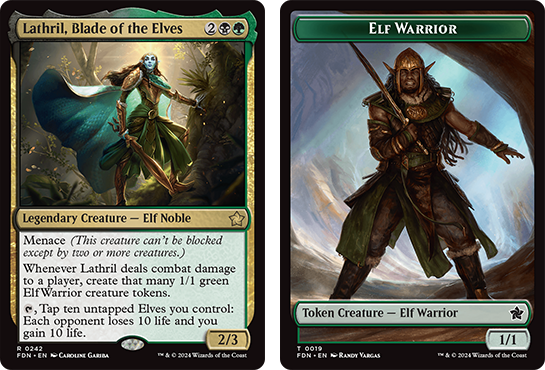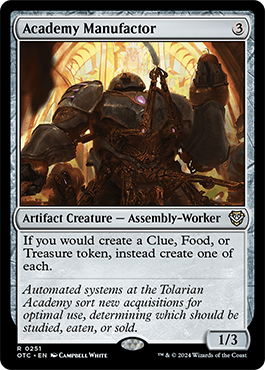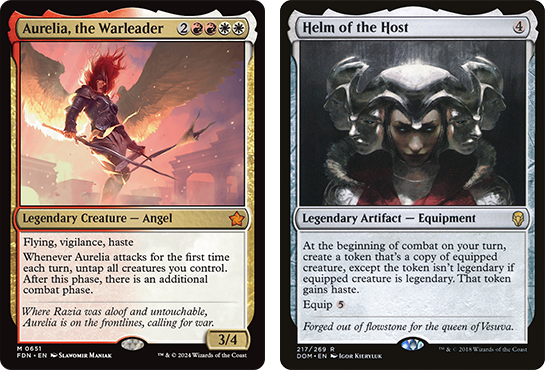Playing a Combo deck in Commander is a surefire way to have a strong win condition and win games. However, it can sometimes feel unfulfilling. Why can playing Combo in Commander feel a bit boring? Kristen is here with her thoughts.
There are many different decks in Magic, from classic Jund to Lantern Control. If we boil down these decks to their basic archetypes, we end up with a rock-paper-scissors of archetypes: Aggro, Midrange, and Control. This level of magnification blurs out some of the other archetypes on the peripheries, so if we zoom out, we can get a better sense of the archetypes, especially in how they relate to Commander.
The different archetypes in Magic might also be seen along the lines of Aggro, Midrange, Control, Stax, and Combo. Does this better represent Commander? Well, the issue with Commander is that it’s a multiplayer format, and the same lenses we look at 1v1 Magic through might not give us an accurate representation.
COMBO IN COMMANDER
One sticking point is Combo. Combo decks are a thing in 1v1 Magic, but Combos as win conditions sneak their way into all archetypes of Commander decks. Some are mean and lean Combo decks that play an A+B Combo, often with part A being in the Command Zone. Others run combos in their decks that need 3 or 4 moving pieces, game pieces that are otherwise just solid value. This presents a level of inevitability.
Others still use a cheeky combo as a way to end a game that has gone on too long, or for when their primary win condition – combat damage, or mill – hasn’t proved fruitful.
Whatever way a Combo is played, and why, one fact remains: Combo can feel unfulfilling in Commander. Why is that?
WHY CAN COMBO FEEL UNFULFILLING?
In some games, a combo drops at what feels like an inappropriate time. I’d say this is the main reason combos can feel unfulfilling. It might be that it feels like a game hasn’t been played yet, and so it’s basically an anticlimax.
When an early combo happens in decks that want to present a win as early as Turn 5, it’s generally much more reasonable to shuffle up again and go to the next game. When the decks at a table aren’t likely to present a win until Turn 7-8, an early combo can really take the wind out of a game’s sails.
Part of what makes Commander a fun format to many people is the chance for every deck at the table to get to be involved and make meaningful plays. While it’s true that for certain decks to “do the thing” it means other decks don’t get to “do the thing”; and while it’s true that inevitably some interaction or removal means some players don’t get to “pop off” as much as others, there’s a big difference between making plays that alter the tempo of the game, and in dropping a combo before a game has meaningfully taken place.
There are three main phases in a game of Commander: Set-up, the Midgame, and the Endgame. If the other players at a table haven’t emerged from the Set-up before a combo ends the game, then it can feel like a damper on the fun of seeing the game progress.
MISMATCHES IN DECKBUILDING AND INTENT
The foundation to any fulfilling game or competition is to have it be a skill-testing match up. Beating up a room of kids with your black belt isn’t engaging or stimulating. It’s literally like taking candy from a baby. It’s too easy, and in doing so, you take away that sweet motivation and enjoyment from someone who is, largely speaking, an innocent bystander in your act.
It’s no secret that most salt in Commander comes from when pre-game chats and matchmaking don’t quite line up. I’ll always say that game #1 with a new group is always about calibration, but when the game goes awry in subsequent games, then it can be very frustrating indeed.
For a combo deck to feel fun to play, it needs to play in the right pool. Combo decks need opponents to present a similar clock, and have a similar attitude towards the type of game desired. It’s no use having a pod of three people who want to experience a narrative and show off their cool thematic decks and pet cards, with one person who slams a combo in the middle of that story.
While it’s easy to identify the three players who might feel hard-done by in this scenario, it’s also fair to assume that many combo players in this scenario will also feel similarly deflated. If you ignore bad actors – of which there will always be some – the majority of people who play fast and powerful decks want to play against similar decks. They want to have their skill tested, and they want to feel like they worked for a win.
It’s one of the reasons I don’t play Teferi’s Protection in my Sunforger Syr Gwyn deck. It would be tuning it one notch too high for the tables the deck is designed for. It’s not a combo deck, after all. It wants to play longer games. I want to present a challenge for opponents to unpick, not introduce an insurmountable advantage. That way it’s skill testing for me, too – I get to choose how and when to use my limited suite of reactionary spells, and not rely on the crutch of tutorable Teferi’s Protection.
Ultimately, what I’m tryin’ to say here is that bringing a combo to the wrong table can feel like bringing a gun to a knife fight.
If you feel like Indy during a game, then you’re probably not playing the right deck at the right table. It can feel inappropriate when the rest of the table don’t play enough interaction, or play a slower game.
COMBOS CAN RUIN THE IMAGE OF YOUR DECK
Here’s one that I don’t see talked about very often, but an aspect that I think is key to enjoyment of the format.
Whenever you add a high-variance card to your deck, you need to consider how powerful that card is in a vacuum, and how powerful playing it will feel vs the average draw of your deck.
When I played my GW Angels deck, I ran Kindred Summons. Kindred Summons in an Angels deck was a strong play; it would get me 2-3 Angels on average, help me get my haymakers like Serra’s Emissary and Avacyn, Angel of Hope into play, and be a way to spend my big Angel mana on a surprise interactive play.
Contrast that to how Kindred Summons performs in an Elfball deck. It can be dropped super early thanks to running mana dorks, and it can hit for 6-10, easily, especially in a deck like Lathril that makes many Elf tokens. This turns from a solid tempo play to a game-winning spell depending on the context.
Consider instead Academy Manufactor, a card I really dislike. The reason I dislike it is largely because it can “spike” the average plays of a dedicated Food or Clues deck in such a way, so early on the curve, that the deck performs significantly better than it does without it.
Now, when you play cards like this, you tend to experience a different phenomenon to casting Kindred Summons in an Angels deck. It’s a lot closer to Kindred Summons in an Elf deck, but on top of that, it can open up lines of play that help you win a game you had no right to win, and much sooner than your more average game.
The net result is that people will be forced to evaluate your deck as if you have the big play in hand every game. This shift in attitude toward your deck can be very off-putting to experience, and many people don’t realize that actually, the threat assessment and attitude is earned and fair.
None of the cards I’ve listed above are combos, but I wanted to illustrate the journey of how we get to evaluating combos. When your deck contains a 2-piece combo that it can naturally draw earlier in the game, that “Inevitability” turns into a spike-y result, and a result that will be emblazoned in the minds of your opponents forever more. They will change their play patterns or even what deck they bring to the table to calibrate for you dropping that combo that “doesn’t usually happen” on turn 4-5.
This is exacerbated when you run a Commander that itself is a combo piece or enabler. Not only will people project their experience of playing against combo decks onto it, the moment they find out you run anything that can combo with your Commander? Well, you’re threat numero uno. You have clearly signposted inevitability.*
*Which is why if you do want to combo, or do cool s***, you’re always better picking a less popular Commander that people see less often
A NOTE ON INFINITE VS NON-DETERMINISTIC COMBOS
Not all combos are created equally, and indeed, many game-winning “combinations” of cards aren’t even infinite.
All of these can be considered combos:
- A two card combo that goes infinite (An A+B combo)
- A combo that needs multiple cards to go infinite (A+B+C, or higher)
- A non-deterministic loop that will eventually fail due to lack of mana or resources
- A non-deterministic loop that needs significant investment to pop off (in the graveyard, in play, in hand, etc)
- An A+B combo involving one card in the Command Zone
Yet, even if they are all combos, they’re all going to register different threat levels on your radar, right?
Knowing what type of win conditions you’re up against rapidly changes how you play and interact, and – for me, personally – how I mulligan. Keep in mind that other players will make the very same threat assessments against you. And they’re right to!
If they know an A+B is coming, they have to assume it could be on any turn, or they might just be dead to it. If they know you have a non-deterministic loop, they might give you a little more breathing space.
These different ways of winning with combos, and the different decks that they are found in, contribute massively to how fulfilling it feels to pull them off – and, indeed, how fulfilling they feel to play against.
END STEP
Playing Combo can be fun, and at the right tables a really good time. It can also prove to be a bit of an anti–climax. I know the first few times I won with Helm of the Host in Aurelia off of an empty board it didn’t feel the most earned or exciting, especially as I slotted Helm in as inevitability, and didn’t intend the deck to be my “combo” deck, with multiple win cons.
Have you had any similar experiences? Let us know on BlueSky.

Kristen is Card Kingdom’s Head Writer and a member of the Commander Format Panel. Formerly a competitive Pokémon TCG grinder, she has been playing Magic since Shadows Over Innistrad, which in her opinion, was a great set to start with. When she’s not taking names with Equipment and Aggro strategies in Commander, she loves to play any form of Limited.

